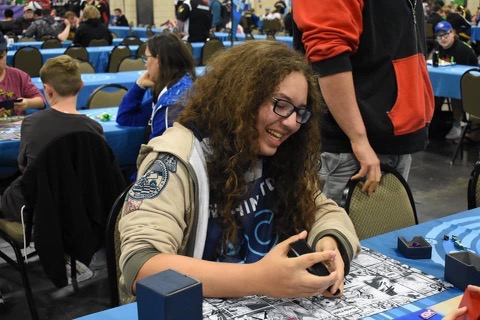Bos sophomore makes bank playing Pokemon

Ian Viets plays at a Knoxville Tenn. tournament in 2019.
Young Ian Viet’s eyes latched onto a group of people playing with Pokémon cards while he was on vacation. In that very moment it clicked: he knew he wanted to learn to play right away.
Luckily, he was right next to a card store.
“I was in third grade,” he said. “I thought, ‘I really want to do something with this.’”
Now a sophomore, Viets competes in Pokémon tournaments around the U.S. and wins various prizes. Viets competes in area, regional and even international tournaments.
Tournaments can be very time consuming. Area tournaments can take from two to three hours, and regional and international tournaments can last up to 12 or 13 hours, Viets said. Within these periods of tournament play, players will play nine rounds, usually 50 minutes per game.
Despite the cards’ and characters’ popularity, many younger kids do not know how to truly play the game, Viets said. The rules are complex and have many moving parts, including 60 cards, a Pokemon, a trainer and energy cards.
“YouTube channels like the official Pokemon YouTube channel have a very good way of explaining it, because it does take a little bit of time,” Viets said.
Viets played in his first regional tournament in Orlando, Fla. in 2016 and tallied five wins and three losses. He finished in the top 13.
“It was a weird feeling,” Viets said.
Viets won a box of content from his rankings. As Viets progressed he started aiming for higher rankings and different prizes.
“I was like, ‘Wait, what happens if I make the top eight?’ They said, “Oh, you get cash prizes and three boxes of product,’” he said
In 2019, Viets won a regional championship in Knoxville, Tenn. He won three prize boxes and $1,500, the typical first place prize.
Viets said so far he has won a total of $10,000 in cash and over 50 boxes of product.
“Back then I was like, ‘I don’t care about the cash, I care about the boxes,’” he said. “Now, yeah, I care about the cash.’”
Despite being typically marketed as a children’s game, Viets said that with cash at stake, the tournaments also can attract unethical players.
“Knowing a sense of right and wrong can truly be beneficial to players,” he said. “As you go in, obviously have a sense of what’s right. If somebody said, ‘Hey, I’ll pay you 500 bucks to lose the game,’ don’t do that.”
Along with experience, Viets has made connections within the community.
“Get to know the local people in your area because those are the people that you’re most likely going to see,” he said. “If you can build good relations with them, you could start building up to having good relationships with, like, the top players.”
Your donation will support the student journalists of Boswell High School. Your contribution will allow us to purchase equipment and cover our annual website hosting costs.
